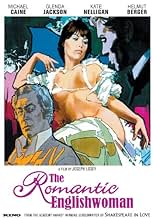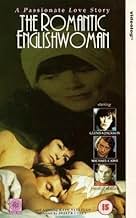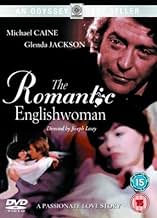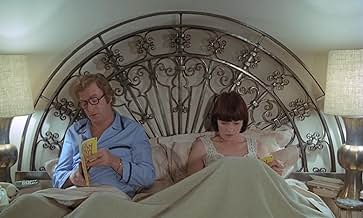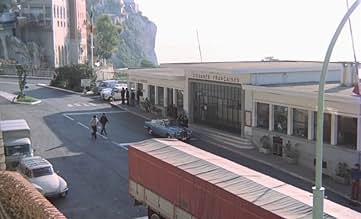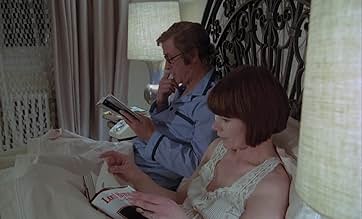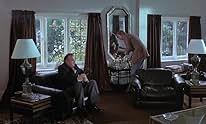IMDb RATING
6.0/10
1.6K
YOUR RATING
A marriage crisis between a writer and his wife leads her to flee to Germany and eventually return with another man, through whom the writer is going to overcome his writer's block.A marriage crisis between a writer and his wife leads her to flee to Germany and eventually return with another man, through whom the writer is going to overcome his writer's block.A marriage crisis between a writer and his wife leads her to flee to Germany and eventually return with another man, through whom the writer is going to overcome his writer's block.
Michael Lonsdale
- Swan
- (as Michel Lonsdale)
Béatrice Romand
- Catherine
- (as Beatrice Romand)
Reinhard Kolldehoff
- Herman
- (as Rene Kolldehoff)
Featured reviews
From the film's title and credits, I had assumed it would be a hysterical melodrama but, in general, I was pleasantly surprised by the result! As expected from this director, it's a stylish film but not an easy one: in fact, it's been likened to Alain Resnais' LAST YEAR AT MARIENBAD (1961) - though it's not quite that mystifying!
Still, the plot does blur the confines which separate fact from fiction, especially in the way novelist/screenwriter Michael Caine bases the affair between a man and a woman who meet while on holiday in a foreign city - and which we see enacted from time to time - on the one he suspects went on between his wife (Glenda Jackson) and a young German gigolo (Helmut Berger) in Baden-Baden. The latter, however, is not as naïve and innocuous as he seems to be; apart from being a crook, when invited by Caine to England, he insinuates himself into the couple's household: charming the nanny who takes care of their child, intriguing the apprehensive Caine (playing a character named Lewis Fielding, whereupon Berger presents himself as an admirer citing "Tom Jones" as his favorite novel - actually written by Henry Fielding!) but who still makes him his secretary, while Jackson is annoyed and evidently uncomfortable with the whole tension-filled set-up.
The three stars are excellent, but Caine's character is especially interesting; curiously enough, when presented with the idea for his script, he finds it boring and proposes to change it into a suspenser but, after realizing that the drama held greater resonance for him than he had anticipated, he is unaware of the parallel thriller subplot wherein Berger falls foul of his criminal associates (led by the smooth Michel Lonsdale)! The cast also features Rene' Kolldehoff (as Caine's extravagant producer), Nathalie Delon (severely underused, despite her "Guest Artist" credit) and Kate Nelligan (as a gossipmonger friend of the Fieldings).
The script by Tom Stoppard and Thomas Wiseman (from the latter's novel) is actually very funny, particularly Caine's explosive put-down of Nelligan on her very first appearance (though when Jackson eventually leaves him for Berger, she goes to see how he's doing and they make up), a society dinner in which Caine ends up drunk and Delon is mistaken for a hooker and, again, Caine's close encounter with gangster Lonsdale. Here, Losey also does some interesting things with his camera (Gerry Fisher was the cinematographer) and Richard Hartley's score is notable, too.
I've only watched this and MR. KLEIN (1976) from Losey's final period (1972-85), during which there were evident signs of decline; even if overlong and emerging, ultimately, as a lesser work, the film is more enjoyable - and rewarding - than could be gleaned from a mere reading of its synopsis...
Still, the plot does blur the confines which separate fact from fiction, especially in the way novelist/screenwriter Michael Caine bases the affair between a man and a woman who meet while on holiday in a foreign city - and which we see enacted from time to time - on the one he suspects went on between his wife (Glenda Jackson) and a young German gigolo (Helmut Berger) in Baden-Baden. The latter, however, is not as naïve and innocuous as he seems to be; apart from being a crook, when invited by Caine to England, he insinuates himself into the couple's household: charming the nanny who takes care of their child, intriguing the apprehensive Caine (playing a character named Lewis Fielding, whereupon Berger presents himself as an admirer citing "Tom Jones" as his favorite novel - actually written by Henry Fielding!) but who still makes him his secretary, while Jackson is annoyed and evidently uncomfortable with the whole tension-filled set-up.
The three stars are excellent, but Caine's character is especially interesting; curiously enough, when presented with the idea for his script, he finds it boring and proposes to change it into a suspenser but, after realizing that the drama held greater resonance for him than he had anticipated, he is unaware of the parallel thriller subplot wherein Berger falls foul of his criminal associates (led by the smooth Michel Lonsdale)! The cast also features Rene' Kolldehoff (as Caine's extravagant producer), Nathalie Delon (severely underused, despite her "Guest Artist" credit) and Kate Nelligan (as a gossipmonger friend of the Fieldings).
The script by Tom Stoppard and Thomas Wiseman (from the latter's novel) is actually very funny, particularly Caine's explosive put-down of Nelligan on her very first appearance (though when Jackson eventually leaves him for Berger, she goes to see how he's doing and they make up), a society dinner in which Caine ends up drunk and Delon is mistaken for a hooker and, again, Caine's close encounter with gangster Lonsdale. Here, Losey also does some interesting things with his camera (Gerry Fisher was the cinematographer) and Richard Hartley's score is notable, too.
I've only watched this and MR. KLEIN (1976) from Losey's final period (1972-85), during which there were evident signs of decline; even if overlong and emerging, ultimately, as a lesser work, the film is more enjoyable - and rewarding - than could be gleaned from a mere reading of its synopsis...
Glenda Jackson's frustrated bourgeois housewife, having gone to the spa town of Baden-Baden for unspecified reasons, maybe or maybe doesn't have a brief affair with Helmut Berger's young gigolo. In town on a botched drug deal, Berger operates through a combination of what we might term freelancing: as a car or drug smuggler but, it seems, principally as a gigolo whose opening line is that he's a "poet". Meanwhile, back in British suburbia, Jackson's husband, writer Michael Caine abandons plans to work on a novel to begin a screenplay based on his jealous imaginings of his wife's Baden-Baden sojourn. When Berger telephones Caine to announce that he's an admirer of his work and turns up (literally) "for tea", the stakes are set for the triangle to play out, with the added drama in the final third of Berger's drug connections, among them the poker-faced, and sadly under-used, Michael Lonsdale, turning up in a kind of lugubrious pursuit.
During the 1960s and 70s, Joseph Losey reinvented himself from a filmmaker of social problem pictures and taut, gritty noirs, to an arthouse director, with mixed results. In some cases-notably his collaborations with Harold Pinter, 'Accident' and 'The Go-Between'-formal innovations-particularly Alain Resnais-style temporal ambiguity-were closely allied to a dissection of the British class system. In others, such as the camp classics 'Boom!' or 'Secret Ceremony', it's not clear exactly *what's* going on-and not necessarily in a good way. Essentially, what we watch is a set of variations on a theme, more or less successfully rendered. Take the use of flashbacks and flashforwards: longer or shorter inserts of scenes whose relation to the main narrative is not immediately revealed, used particularly good effect in the late '60s/early '70s Pinter collaborations 'Accident' and 'The Go-Between'. In 'The Romantic Englishwoman', the flashbacks/forwards centre on an incident that occurs near the start of the film: the moment Jackson and Berger take a lift together in their hotel and may or may not initiate a sexual relationship. This incident is a way to explore the boundaries between action and desire, and various real or imaginary pairings of the heterosexual couple and a third partner. What happened in the lift in Baden-Baden? From whose perspective do we see this?
As the film goes on, though, not much done is to expand these initially intriguing ideas. The film couldn't easily be called either a feminist or an anti-feminist film: Caine's obnoxious outburst at Jackson's friend, a visiting gossip columnist, for repeating feminist statements about female homemaking roles, is clearly absurd, yet, like Jeanne Mourea's Eve, Jackson's dreams of liberation from marriage can occur only through another man, offering no real possibility of sociability outside the heterosexual contract. We thus simultaneously watch the playing out of male jealousy and of Jackson's "romantic" desire for escape--the doomed template of much melodrama. Too often, though, the film simply *presents* this double-bind, offering little other perspective on what we already know. The flashback-flashforward structure insists on the claustrophobic way in which its characters play out pre-ordained social roles, yet it has little to say *about* such roles, apart from telling us that they exist. The result: a film that ultimately feels "cold", dead, an exercise in style.
During the 1960s and 70s, Joseph Losey reinvented himself from a filmmaker of social problem pictures and taut, gritty noirs, to an arthouse director, with mixed results. In some cases-notably his collaborations with Harold Pinter, 'Accident' and 'The Go-Between'-formal innovations-particularly Alain Resnais-style temporal ambiguity-were closely allied to a dissection of the British class system. In others, such as the camp classics 'Boom!' or 'Secret Ceremony', it's not clear exactly *what's* going on-and not necessarily in a good way. Essentially, what we watch is a set of variations on a theme, more or less successfully rendered. Take the use of flashbacks and flashforwards: longer or shorter inserts of scenes whose relation to the main narrative is not immediately revealed, used particularly good effect in the late '60s/early '70s Pinter collaborations 'Accident' and 'The Go-Between'. In 'The Romantic Englishwoman', the flashbacks/forwards centre on an incident that occurs near the start of the film: the moment Jackson and Berger take a lift together in their hotel and may or may not initiate a sexual relationship. This incident is a way to explore the boundaries between action and desire, and various real or imaginary pairings of the heterosexual couple and a third partner. What happened in the lift in Baden-Baden? From whose perspective do we see this?
As the film goes on, though, not much done is to expand these initially intriguing ideas. The film couldn't easily be called either a feminist or an anti-feminist film: Caine's obnoxious outburst at Jackson's friend, a visiting gossip columnist, for repeating feminist statements about female homemaking roles, is clearly absurd, yet, like Jeanne Mourea's Eve, Jackson's dreams of liberation from marriage can occur only through another man, offering no real possibility of sociability outside the heterosexual contract. We thus simultaneously watch the playing out of male jealousy and of Jackson's "romantic" desire for escape--the doomed template of much melodrama. Too often, though, the film simply *presents* this double-bind, offering little other perspective on what we already know. The flashback-flashforward structure insists on the claustrophobic way in which its characters play out pre-ordained social roles, yet it has little to say *about* such roles, apart from telling us that they exist. The result: a film that ultimately feels "cold", dead, an exercise in style.
Spa towns seem to have an odd effect on film-makers. Alain Resnais' "Last year in Marienbad", set in the Czech spa town of that name, has a reputation for being bafflingly obscure, so much so that it won itself a place in Michael and Harry Medved's "Fifty Worst Films of All Time". And then there is Joseph Losey's "The Romantic Englishwoman", part of which is set in the German spa town of Baden Baden.
The plot concerns Elizabeth, the "romantic Englishwoman" of the title and the wife of a well-known novelist. While staying in Baden Baden Elizabeth has an affair with a young German named Thomas. Or does she? Is it possible that this "affair" was simply a fantasy on her part? Or does it only exist in the mind of her jealous husband Lewis? Thomas, an admirer of Lewis' work, later comes to stay with Lewis and Elizabeth at their home in England, where Lewis makes him surprisingly welcome for a man who is (or whom he believes to be) his wife's lover. There is also a sub-plot about Thomas' criminal associates, led by a man named Swan, who are pursuing him across Europe, but the exact details remain vague.
There is an adage that one should never judge a book by its cover, and the cinematic equivalent would probably be "don't judge a film by the big names in its title sequence". Even if you have admired the other work of those names. Michael Caine (now Sir Michael) is one of the cinema's greatest stars, appearing in some of the best British films of the sixties, seventies and eighties such as "Alfie", "Get Carter" and "Educating Rita". Glenda Jackson is today best known as a Labour politician, but was a fine actress in her youth. Scriptwriter Tom Stoppard is perhaps Britain's greatest living playwright. Losey was best known to me as the director of "The Go-Between", one of the major British films of the early seventies and one of the films which started the "heritage cinema" movement.
Unfortunately, all this assembled talent does not make for a good film. "The Romantic Englishwoman" goes to show that baffling obscurity was not a monopoly of the Nouvelle Vague and that British art-house film-makers could be just as infuriatingly obscure as their French counterparts. (Losey was American by birth, but I count him as an honorary Briton. He was forced to leave Hollywood during the McCarthy era because of his left-wing sympathies and thereafter worked mostly in Britain). I would not quite count this among my all-time fifty worst films, but it is nevertheless a dull and confusing one which not only lacks a clear storyline but also lacks any perceptible point. There are some films where ambiguity can be a positive virtue rather than a fault, but this is not one of them. 4/10
The plot concerns Elizabeth, the "romantic Englishwoman" of the title and the wife of a well-known novelist. While staying in Baden Baden Elizabeth has an affair with a young German named Thomas. Or does she? Is it possible that this "affair" was simply a fantasy on her part? Or does it only exist in the mind of her jealous husband Lewis? Thomas, an admirer of Lewis' work, later comes to stay with Lewis and Elizabeth at their home in England, where Lewis makes him surprisingly welcome for a man who is (or whom he believes to be) his wife's lover. There is also a sub-plot about Thomas' criminal associates, led by a man named Swan, who are pursuing him across Europe, but the exact details remain vague.
There is an adage that one should never judge a book by its cover, and the cinematic equivalent would probably be "don't judge a film by the big names in its title sequence". Even if you have admired the other work of those names. Michael Caine (now Sir Michael) is one of the cinema's greatest stars, appearing in some of the best British films of the sixties, seventies and eighties such as "Alfie", "Get Carter" and "Educating Rita". Glenda Jackson is today best known as a Labour politician, but was a fine actress in her youth. Scriptwriter Tom Stoppard is perhaps Britain's greatest living playwright. Losey was best known to me as the director of "The Go-Between", one of the major British films of the early seventies and one of the films which started the "heritage cinema" movement.
Unfortunately, all this assembled talent does not make for a good film. "The Romantic Englishwoman" goes to show that baffling obscurity was not a monopoly of the Nouvelle Vague and that British art-house film-makers could be just as infuriatingly obscure as their French counterparts. (Losey was American by birth, but I count him as an honorary Briton. He was forced to leave Hollywood during the McCarthy era because of his left-wing sympathies and thereafter worked mostly in Britain). I would not quite count this among my all-time fifty worst films, but it is nevertheless a dull and confusing one which not only lacks a clear storyline but also lacks any perceptible point. There are some films where ambiguity can be a positive virtue rather than a fault, but this is not one of them. 4/10
When you find "The Romantic Englishwoman" on IMDB, you might notice that the poster displayed (at least currently) makes the movie look like a porno picture! Jackson is wearing practically nothing and the pose is quite provocative. While there is a bit of nudity in the film and its plot about adultery, it's not a porno picture and I hate when unscrupulous studios try to mismarket movies this way. And, if you are looking for a skin flick, you definitely should look elsewhere.
When the story begins, Elizabeth Fielding (Glenda Jackson) is on holiday by herself at a German spa town. She wants some alone time as well as to 'discover' herself. Her husband is a writer who is at home with the kids and she either had an affair when she's there or wants to have one and imagines it (it's a bit vague due to the direction but it looked like she probably DID engage in an affair). She arrives back home and at first their reunion is very passionate, as the Fieldings make love on their front lawn...something most couples only do on occasion (perhaps every other week)! But the marriage returns to the tedium that apparently drove her to take this solo vacation in the first place. and, soon the man she had an affair with (or fantasized about) arrives for a visit and, oddly, Mr. Fielding's writers block seems to disappear.
Despite this film being about a troubled marriage and adultery, it's also amazingly sterile and, perhaps, dull. I agree with another reviewer who also felt this way. They thought having the film begin with the husband and wife apart and for such a big part of the movie further emphasized this sterility and made you care much less about the Fieldings or their marriage. Too often, performances are rather stodgy and the fireworks you might expect just aren't there most of the time. It is not another "Who's Afraid of Virginia Woolf?"...where a couple's relationship spirals out of control with vitriol and tons of emotion.
When the story begins, Elizabeth Fielding (Glenda Jackson) is on holiday by herself at a German spa town. She wants some alone time as well as to 'discover' herself. Her husband is a writer who is at home with the kids and she either had an affair when she's there or wants to have one and imagines it (it's a bit vague due to the direction but it looked like she probably DID engage in an affair). She arrives back home and at first their reunion is very passionate, as the Fieldings make love on their front lawn...something most couples only do on occasion (perhaps every other week)! But the marriage returns to the tedium that apparently drove her to take this solo vacation in the first place. and, soon the man she had an affair with (or fantasized about) arrives for a visit and, oddly, Mr. Fielding's writers block seems to disappear.
Despite this film being about a troubled marriage and adultery, it's also amazingly sterile and, perhaps, dull. I agree with another reviewer who also felt this way. They thought having the film begin with the husband and wife apart and for such a big part of the movie further emphasized this sterility and made you care much less about the Fieldings or their marriage. Too often, performances are rather stodgy and the fireworks you might expect just aren't there most of the time. It is not another "Who's Afraid of Virginia Woolf?"...where a couple's relationship spirals out of control with vitriol and tons of emotion.
My very first contact with Joseph Losey's canon is this film adapted from Thomas Wiseman's eponymous novel, the reason why I selected this one purely because of its cast, namely for Glenda Jackson, the two-times Oscar winner, whose work has eluded me until now, but the film itself turns out to be a very disappointing misfire.
Speaking of the cast, Glenda Jackson has her charismatic dignity in almost every scene although regularly shoehorned between Berger's perpetual snug grin and Caine's perpetual sullen stare, and eventually cannot save the film from the mire of a psychological drama swamped with behavioral absurdities and non-consistent narrative. The fierce-looking wife with a bob cut and perfectly trimmed fringes, who is discontent with her middle-class lifestyle (her writer husband has immersed into the writer's block when writing a film script and becomes paranoid about her adultery in her solo trip to Baden-Baden), tries her luck to elope with a self-claimed German poet (whose real identity is only hinted by smuggling small-time drugs and cruising of elderly lonely-hearts), whom she has met before in Baden- Baden, but is there a fling between them in their previous encounter? The film never answer the question, a corny exploit being overused here.
Richard Harley's lyrical string score has stolen the thunder since more often than not, I am very much a visual observer than a sonic perfectionist. Also I quite prefer the slowly panning camera in carefully constructing a hunter and prey game in the beginning part in Baden- Baden to the dreadful and ostentatious meandering in the labyrinth of feigned sentimentality, claiming inane quips like "Englishwoman is the most romantic" (Berger's German accent is a major buzz-killer), I hope someone else could be fortunate enough to fully digest all the hocus-pocus and be grateful towards this ill-fated film adaption.
Speaking of the cast, Glenda Jackson has her charismatic dignity in almost every scene although regularly shoehorned between Berger's perpetual snug grin and Caine's perpetual sullen stare, and eventually cannot save the film from the mire of a psychological drama swamped with behavioral absurdities and non-consistent narrative. The fierce-looking wife with a bob cut and perfectly trimmed fringes, who is discontent with her middle-class lifestyle (her writer husband has immersed into the writer's block when writing a film script and becomes paranoid about her adultery in her solo trip to Baden-Baden), tries her luck to elope with a self-claimed German poet (whose real identity is only hinted by smuggling small-time drugs and cruising of elderly lonely-hearts), whom she has met before in Baden- Baden, but is there a fling between them in their previous encounter? The film never answer the question, a corny exploit being overused here.
Richard Harley's lyrical string score has stolen the thunder since more often than not, I am very much a visual observer than a sonic perfectionist. Also I quite prefer the slowly panning camera in carefully constructing a hunter and prey game in the beginning part in Baden- Baden to the dreadful and ostentatious meandering in the labyrinth of feigned sentimentality, claiming inane quips like "Englishwoman is the most romantic" (Berger's German accent is a major buzz-killer), I hope someone else could be fortunate enough to fully digest all the hocus-pocus and be grateful towards this ill-fated film adaption.
Did you know
- TriviaSir Dirk Bogarde turned down the role of Lewis Fielding.
- GoofsWhen the Glenda Jackson character first arrives back from abroad and wanders around her home, the camera crew can be seen reflected in the glass of a picture on the wall.
- ConnectionsFeatured in Premio Donostia a Michael Caine (2000)
- How long is The Romantic Englishwoman?Powered by Alexa
Details
- Release date
- Countries of origin
- Languages
- Also known as
- The Romantic Englishwoman
- Filming locations
- Production companies
- See more company credits at IMDbPro
Box office
- Budget
- $1,200,000 (estimated)
- Runtime
- 1h 56m(116 min)
- Sound mix
- Aspect ratio
- 1.85 : 1
Contribute to this page
Suggest an edit or add missing content



